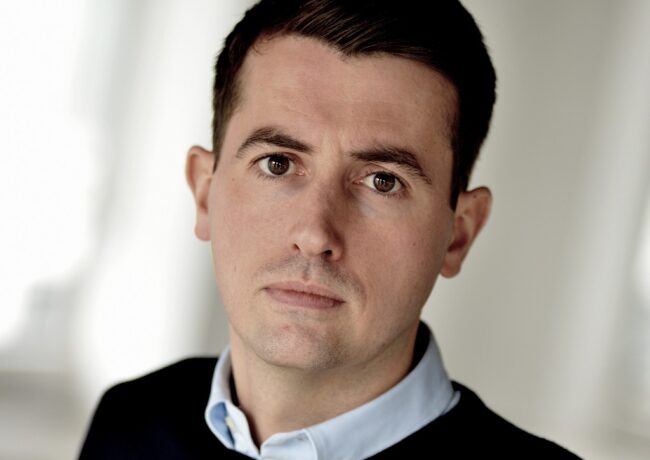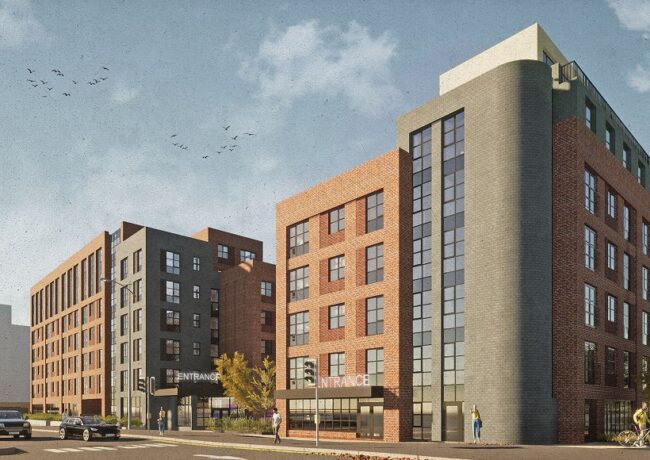Dissecting OBI’s digital difference
OBI Property has become synonymous with Manchester’s rising digital sector, advising Rentalcars, AO.com, NCC Group, Zuto, bringing WeWork out of London for the first time in the UK, currently brokering a 150,000 sq ft deal for The Hut Group at Airport City, hosting techie events and investing in digital startups. Co-founder Will Lewis talks to Paul Unger about how a surveying practice became a tech player.
PU: You’re closely associated with digital and it’s turned a lot of heads among your competitors. How has that happened? WL: A lightbulb moment was AO.com becoming frustrated that we could do their dilapidations, we could do the search and acquisition, we could project manage someone but as soon as that design piece was outsourced, information leaked all over the place. The world is so small, you’d outsource it to someone and the furniture person would mention it, or the designer would mention it to their mate and it all just went public. That was bad from our point of view. AO pushed us and said ‘it would be really good if you had this design capability in-house’, so we bought a small one-man band design house. Financially it’s not a massive money spinner but it’s been massively important to complete that ‘OBI difference’ as we call it now.
We’ve now got six workplace consultants working with NCC Group, Rentalcars, Zuto, all sorts of big businesses.
So was it driven by client confidentiality rather than a business model? No, part of it was. In order to advise the client properly you need to fully understand the client’s business. It’s not just about rent and rent-free or the cost of the fit-out. Without that workplace consultancy piece you can’t give the client proper advice, I couldn’t tell them that that was the right building for them without someone who knows what they’re talking about, the culture and workplace and different workflows, how different teams are going to interact and collaborate, without that piece going into it. There have been instances where we think we’ve found the right building. And then once our workplace guys come in and go ‘that floor is not right’ or ‘they can’t be split over two floors’. Confidentiality was one thing, but it was having a platform to fully understand what the client’s brief is and other people don’t do that, and they still aren’t doing it. I don’t know how they can properly advise the client until they understand that piece.
Also, when we started the business seven years ago, I think the first year we just operated like we did in our last place and it was only when we started employing people like Emma Powell [now at Gary Neville’s St Michael’s Partnership] and Joe Weilding [part of OBI’s building consultancy team] who hadn’t been in any other property business or a consultancy business before and they used to question us and test us and say ‘well, why are you doing it like that? Why don’t we do this and why don’t we do that.’ That testing was good, so having people outside of the world of property, which in my opinion is still archaic, behind lawyers and all sorts as a sector, helped us and started us thinking about whether we are doing this the right way.
In 2010, Lewis left WHR Property Consultants along with two colleagues, Dominic Horridge, who drives OBI’s prolific building consultancy order book, and investment agent Gary Scorah, who left in 2014 to set up on his own advisory business. OBI – offices, building, investment – now employs 25 staff and turned over £3.5m in the year to April 2017. The business is profitable although Lewis declines to disclose the profit figure.
What was your goal when you were setting up OBI? I had become really disillusioned where I was working. My client base now, ever since setting up OBI, is totally different. I think there is probably only Bruntwood who I have worked with personally through boom-recession-boom. My wish is just to enjoy work. We resigned in October 2009. And then we started on 1 February 2010. Literally, we didn’t have a plan and that’s why everyone thought that we were a bit stupid. It wasn’t a clever move to set up a property consultancy business at that time. The amount of people who were meant to be mates and tried to talk us out of it, I’ll never forget. They got crossed off the Christmas card list because that’s the last thing you want to hear once you’ve made a decision to do something, someone saying ‘what are you doing mate? Just keep your safe job and keep your head down.’ It is exactly the worst thing that I wanted to hear at the time, so I didn’t spend much time with those guys after. You want someone to say ‘yeah, get on and do it, see what can happen’.
How has the Manchester office market changed during OBI’s time? Now you’ve got institutions controlling a lot, even propcos buying and using their partners’ money so they can invest cash and give a seller certainty. I think if you’re selling a building now of any size and someone says ‘we need to go away and get 40% bank loans’, you’re not going to sell to them. And I think the credit committees at banks are far more rigorous, more detailed which is fair enough and I think is good. Valuers are still scarred from what happened after 2007. Most valuers if anything are slightly undervaluing things today. What you’ll sell a building at will be more than what some would value it at, so the invested amount is still very high and the yield is still really keen.
The big thing now is this new type of occupier demand which is fuelling the market and I think will continue to fuel it. It’s totally different to a decade ago. You’d laugh if you thought some e-commerce business which had five people three years ago now has got 300 and was going to take a 10-year lease and pay £30 a foot but there’s people out there in that position. Inward investors now to the city, even they’re different. Bank of New York came, massive, great for the city. Now they’re reining in. The types of inward investors that are looking at the city at the moment, huge, huge, global brands and tech businesses, again it’s a different type of setup.
The other thing that’s changed is how buildings operate and what occupiers expect, both massively different. No one ever talked before about co-working or flexible leasing and all this sort of stuff. Some of the more progressive landlords will now look at doing one-year breaks, which they never used to do. It’s amazing. The fit-out market’s changed massively, it was boring when we started, we used to do fit-outs off a couple of plans and a spec. Now the level of detail even for a small office is drop-down ceilings, feature lighting, intricate details of how the glazing is going to fix into the feature wall. The detail and sophistication of fit-outs has moved on significantly.
Given the economic uncertainty people are warning about what shape do you think Manchester and OBI are in, do you see more strong years or troubled times ahead? I’ve got loads of confidence. We don’t chase the investment market. We end up acting. If we create the value then we’ll sell something and if someone brings us in then we will do it but we will never chase an investment deal. So, what might be a driver is the occupational market. I think the occupational market is very robust and I have a lot of confidence in it and that’s because it’s not finance, professional services. It’s this new enterprise technology digital businesses which I think will continue to drive the economy at least for the next three to five years. Looking at 2018, I think it’s going to continue to go from strength to strength in Manchester and that’s because if you compare us to Birmingham, they’re very much about banks saving money, leaving London, taking big chunks of space or HS2 or government moves and relocations. I’d be worried if our market was built on that but the fact that we are dealing with these businesses that don’t know if they are going to have 500 or 1,000 staff in the next three years, I mean that’s how bonkers it is when you are speaking to some of these big tech businesses. I think Manchester offices are in a really good spot.
This year OBI invested in Revere 3D, a CGI and virtual reality startup relocating from Leeds to Manchester. Will you make more investments in digital? We’ve continued to diversify. We have now got these two guys in doing virtual reality. We’ve got guys on video and we’ve got a graphic designer starting. I’m probably going to move them all into a separate creative digital business. These are all people that most businesses would see as just taking profit off the bottom line – you don’t get paid any more for providing video but you still have to pay them. VR is something which I think will take off more on the development side and this in-house graphic designer, again, it’s an investment for our brand and for the clients and if we weren’t confident we wouldn’t invest in all this stuff.
We always back individuals. I think as the years pass we move further and further away from being a normal property consultancy. I think it would be quite difficult to work out exactly what we are and what we’re going to be but the core business is giving clients the best advice.
There are no individual fee targets or departmental fee targets. It’s all one, so having just one pot encourages everyone to work collaboratively and closely for the greater good of that client as opposed to ‘I’m not doing any more work on that because that’s not coming into my department and I get my bonus judged on that’. There’s none of that. The designers will work with the building consultants to make sure they’re designing something which is (a) deliverable (b) fits in with budget and (c) obviously is going to wow the client. We don’t ever put single people or teams under the microscope. I couldn’t tell you how much workplace consultancy billed this year or last. Some people think that’s bonkers because how do you judge it but I think if the business is working and it’s working that’s all that matters.
Another thing that we have done over the last few years is gone from just being active in Manchester city centre to moving out to do Media City and then also doing Alderley Park and Booths Park for Manchester Science Partnerships and Bruntwood. We’ve looked at moving to Birmingham and up to Leeds. It’s very dependent upon the people. They talked a good game but when we got down to talking numbers they both stayed with the big jobs so then we thought actually let’s just run it from here and have full control of it from Manchester but perhaps diversify slightly in terms of location.
With Manchester’s digital sector now employing 150,000 people and more occupiers emerging all the time, OBI looks likely to ride the technology wave for a long time to come.





Hats off to them. Changed the face of the office market in Manchester. Not sure the way they treat other properly professionals will work very well for them in the medium term, but nice to see innovation and hard work being rewarded.
By JB
Good man Will; good luck.
By Kevin